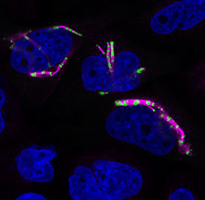Weather Alert: Following the winter storm, all Temple Health hospitals, campuses and clinical locations remain open. Patients will be contacted directly if their visit is affected. Please check TempleHealth.org or FoxChase.org for updates and monitor myTempleHealth for changes to scheduled appointments.
Breadcrumb
- Home
- Fox Chase Cancer Center News
- Researchers Identify the Function of a Novel Breast Cancer Gene
Researchers Identify the Function of a Novel Breast Cancer Gene

PHILADELPHIA (July 10, 2017) – Researchers at Fox Chase Cancer Center have identified the specific ways in which the CCDC170 gene may influence breast cancer risk or progression. The laboratories of Xiaowei Chen, PhD, and Richard A. Katz, PhD, have discovered a function for the CCDC170 protein that suggests a mechanism related to the hallmark changes in cell movement seen in breast cancer.
“Although there was overwhelming genetic evidence for a role for this gene in breast cancer, nothing was known about the normal function of the gene, or a potential cancer mechanism,” said Chen.
After obtaining independent evidence that the CCDC170 gene contributes to breast cancer risk, Chen began to collaborate with Katz and postdoctoral fellow Andrey Poleshko, PhD, to determine the normal function of the CCDC170 gene. The labs soon discovered that the CCDC170 protein localized to the cell’s protein-sorting organelle, the Golgi apparatus. “This was a bit of a surprise, but we quickly became aware of a recently discovered function for the Golgi apparatus in organizing specialized microtubules that control directional cell migration,” said Katz.
Pengtao Jiang MD, PhD, and Yueran Li, MD, PhD, the co-first authors from the Chen lab, went on to obtain evidence that CCDC170 stabilizes microtubules, and indeed contributes to the mechanism of cell migration. The collaborative work revealed further that breast cancer-specific CCDC170 gene truncations could alter the localization of the CCDC170 protein in a variety of ways. “Our findings now provided a mechanism for how disturbances in the CCDC170 gene may contribute to breast cancer initiation and progression, and may open up new therapeutic approaches,” said Chen.
The paper describing this work appears in the new online journal EBioMedicine, a partnership between Cell Press and The Lancet.
Fox Chase Cancer Center (Fox Chase), which includes the Institute for Cancer Research and the American Oncologic Hospital and is a part of Temple Health, is one of the leading comprehensive cancer centers in the United States. Founded in 1904 in Philadelphia as one of the nation’s first cancer hospitals, Fox Chase was also among the first institutions to be designated a National Cancer Institute Comprehensive Cancer Center in 1974. Fox Chase is also one of just 10 members of the Alliance of Dedicated Cancer Centers. Fox Chase researchers have won the highest awards in their fields, including two Nobel Prizes. Fox Chase physicians are also routinely recognized in national rankings, and the Center’s nursing program has received the Magnet recognition for excellence six consecutive times. Today, Fox Chase conducts a broad array of nationally competitive basic, translational, and clinical research, with special programs in cancer prevention, detection, survivorship, and community outreach. It is the policy of Fox Chase Cancer Center that there shall be no exclusion from, or participation in, and no one denied the benefits of, the delivery of quality medical care on the basis of race, ethnicity, religion, sexual orientation, gender, gender identity/expression, disability, age, ancestry, color, national origin, physical ability, level of education, or source of payment.
For more information, call 888-369-2427